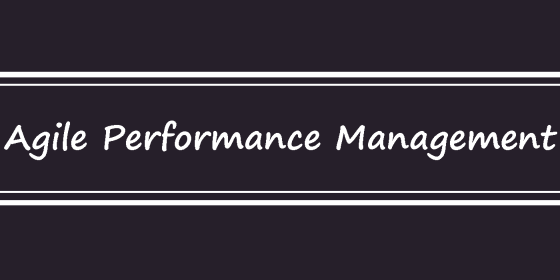Agile Performance Management

Agile Performance Management is an approach to managing employee performance that aligns with Agile principles and practices. It shifts the focus from traditional, annual performance reviews to a more continuous and collaborative process that supports the needs of Agile teams and fosters employee growth and development.
Key aspects of Agile Performance Management include:
- Continuous Feedback: Agile Performance Management emphasizes the importance of providing regular and timely feedback to employees. Managers and peers offer feedback on an ongoing basis, facilitating continuous improvement.
- Frequent Check-ins: Instead of annual performance reviews, Agile Performance Management encourages frequent check-ins between managers and team members. These check-ins provide opportunities to discuss progress, goals, challenges, and development needs.
- Goal Setting and Alignment: Agile Performance Management involves collaboratively setting clear and achievable goals that align with the team’s objectives and the organization’s strategic direction.
- Feedback Loops: Feedback is treated as a two-way conversation, allowing employees to share their insights, concerns, and suggestions with their managers.
- Skill Development: Agile Performance Management includes identifying and supporting the development of skills that are essential for employees to thrive in their current roles and beyond.
- Agile Coaching: Managers act as coaches, guiding employees on their Agile journey, helping them overcome obstacles, and supporting their professional growth.
- Team-Based Performance: Agile Performance Management recognizes and rewards team contributions and achievements, fostering a culture of collaboration and shared success.
- Adaptive Goal Adjustments: Agile Performance Management allows for the adaptation of goals and priorities as circumstances change or new information emerges.
- Strengths-Based Approach: The approach focuses on leveraging employees’ strengths and talents to enhance performance and achieve success.
- Employee Empowerment: Agile Performance Management empowers employees to take ownership of their performance, growth, and career development.
Agile Performance Management is a significant departure from traditional performance management practices, which often focus on rigid processes, top-down evaluations, and fixed performance goals. The Agile approach recognizes that continuous learning, feedback, and adaptation are essential for driving employee engagement and performance in dynamic and rapidly changing business environments.
By adopting Agile Performance Management practices, organizations can create a culture of trust, collaboration, and employee empowerment, leading to improved employee satisfaction, productivity, and overall team performance. It aligns with the Agile principle of individuals and interactions over processes and tools, fostering an environment where employees can thrive and contribute to the organization’s success.